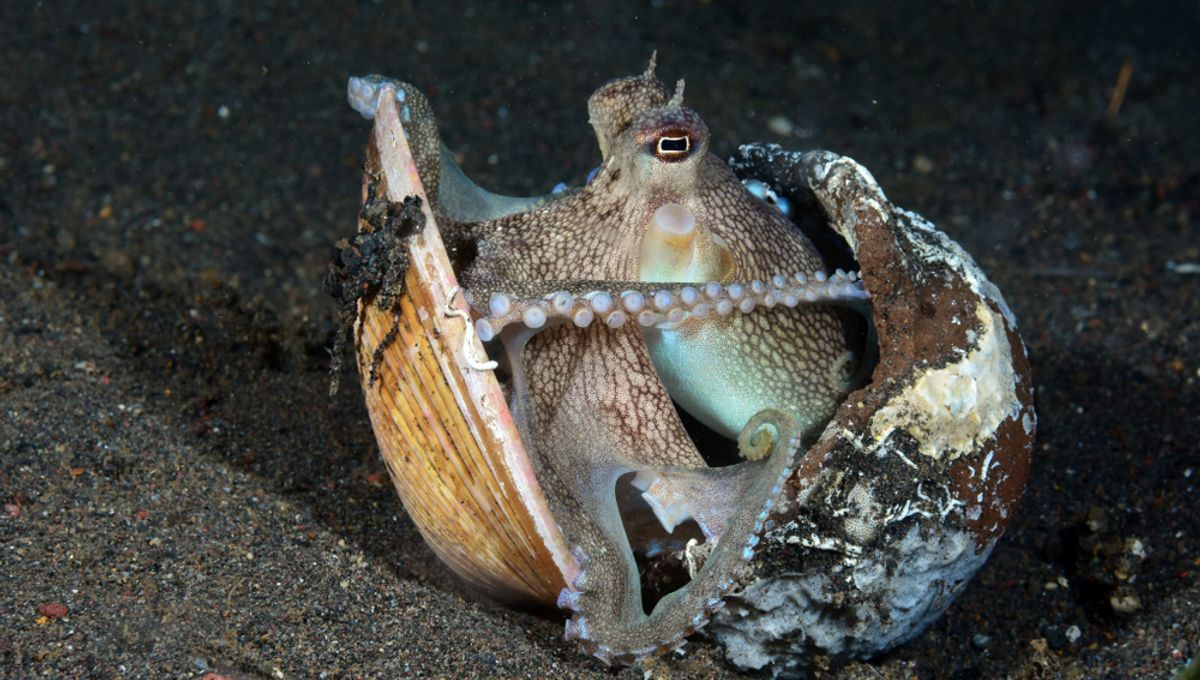
This article first appeared in Issue 8 of our free digital magazine CURIOUS.
It’s no secret that the oceans are home to some of the most alien-like life on the planet, but did you know that astrobiologists actually use octopuses as a model for what intelligence might look like on other planets? The reason why ties into the peculiar anatomy of these curious creatures, and the fact that our last shared ancestor was a worm some 350 million years ago, meaning their intelligence evolved in an underwater world totally separate from our own.
To dive into the cognitive capabilities of octopuses, and to explore their sentience – a concept that’s become increasingly relevant in the study and welfare of cephalopods and crustaceans in recent years – a new project funded by the Wild Animal Initiative is investigating what it’s like to experience life as an octopus. It’s hoped that the insights gleaned from the study will help to inform better legislation around the welfare of these animals, as well as teach us more about how these alien-like lifeforms perceive their environment.
And should it open doors for a new branch of virtual reality (VR) that enables you to explore underwater environments with eight brainy arms? Well, we wouldn’t complain.
To find out more about the research, we spoke to two members of the octopus sentience investigation team, Michaella Pereira Andrade and Tatiana Leite.
Tell us about your upcoming project funded by Wild Animal Initiative.
We are conducting research on the personalities and emotional states of juveniles Octopus insularis. Understanding the behavior and cognitive abilities of octopuses in the wild can provide insight into their ecological and evolutionary adaptations, as well as their sentience and welfare potential. For this, we developed different non-lethal tests so we can study wild octopuses in the field.
What do we know so far about octopus intelligence?
Octopuses have complex nervous systems and are capable of advanced problem-solving and learning. They use tools, such as using coconut shells to hide from predators and manipulate objects to open jars. They can navigate mazes and even solve puzzles. Octopuses are also known to exhibit behaviors such as play, which was once considered limited to mammals and birds.
They also possess a decentralized nervous system, with two-thirds of their neurons located in the arms. This means that each arm can function independently, allowing them to perform complex tasks without the need for centralized processing in the brain.
How is intelligence different from sentience?
Animal intelligence refers to an animal’s cognitive abilities, such as perception, decision-making, and learning. On the other hand, sentience refers to an animal’s ability to have subjective experiences, such as pleasure, pain, fear, and other emotions. While these concepts may be related, sentience pertains explicitly to an animal’s ability to feel the world and is often considered in discussions of animal welfare.
There is currently a lack of specific regulations and guidelines for the welfare of wild octopuses. This is primarily because octopuses are considered to be “wild caught” animals, they are not subject to the same level of oversight and regulation as domesticated animals.
Do octopuses have personalities?
Octopuses have been observed to exhibit a wide range of behaviors, some of which suggest that they may have personalities. Studies have shown that individual octopuses have distinct preferences for certain types of food, shelter, and social interactions, which suggests that they may have individual personalities. Additionally, octopuses have been observed to display aggression, playfulness, and problem-solving abilities, which are all characteristics of animals with personalities. However, more research is needed to fully understand the nature of octopus personalities.
What is it about octopuses that has flagged them as models for studying alien life?
Octopuses have the largest nervous system and largest genome among all invertebrates. They have about 33,000 genes (more than humans, which have about 27,000). Approximately 3,500 of them are unique to this group of animals.
An interesting feature regarding the evolution of octopus genomes is that they have developed the ability to edit RNA to increase the repertoire of proteins produced and thus increase their adaptability to the environment in which they live. Only cephalopods do this. Instead of a DNA sequence producing only one protein, with the ability to recode by editing the RNA, this sequence can generate several proteins with different functions, increasing the animal’s ability to adapt to different situations. In other words, instead of genomic evolution occurring by mutations in DNA sequences, these sequences remain conserved, changing only the ability to edit the genetic codes through RNA.
The team hopes to return results on their research into the lived experiences of the oceans’ aliens in the next year.
CURIOUS is a digital magazine from IFLScience featuring interviews, experts, deep dives, fun facts, news, book excerpts, and much more. Issue 11 June 2023 is OUT NOW.
Source Link: Octopuses Are Smart, Sentient… Aliens?